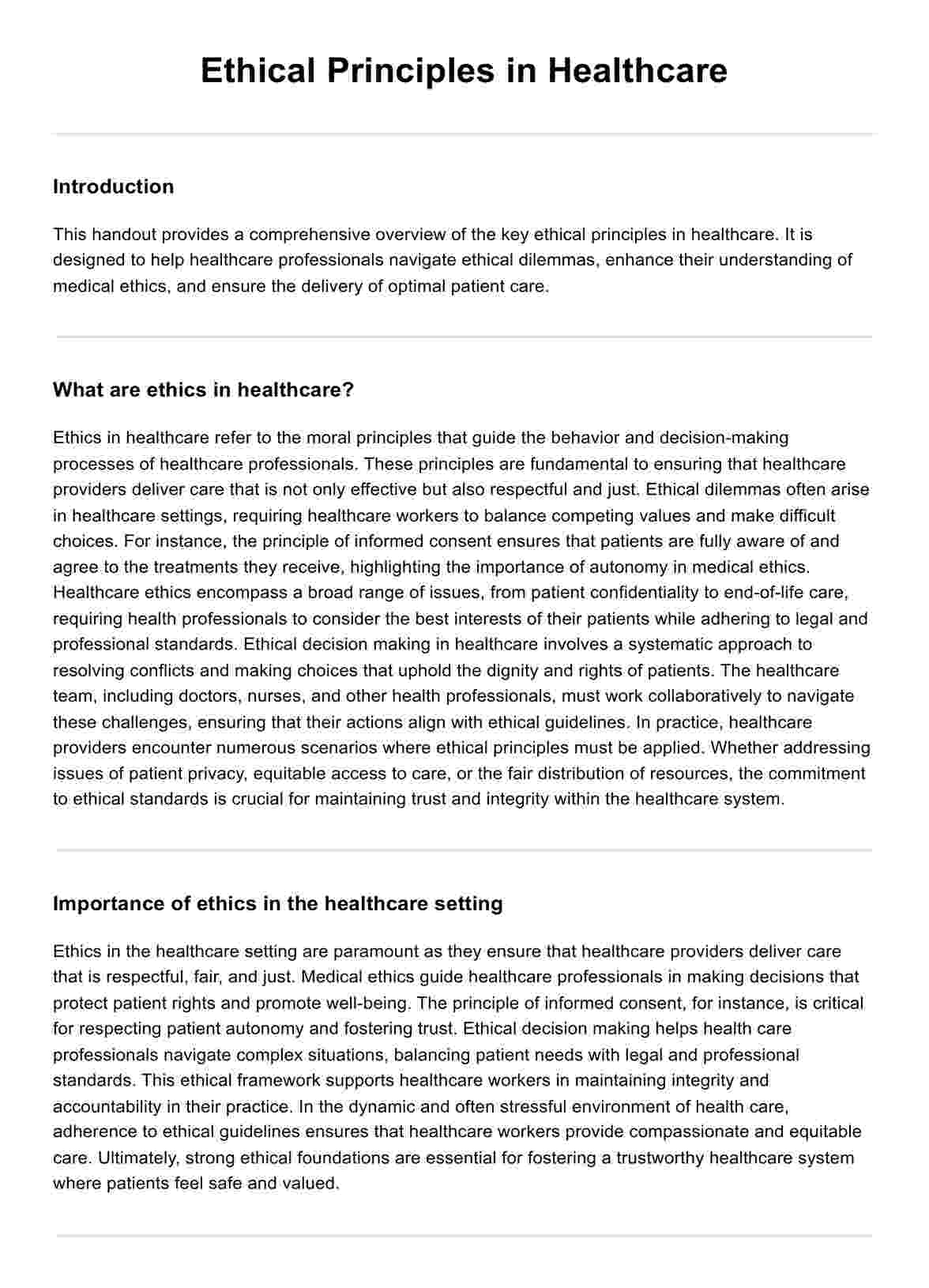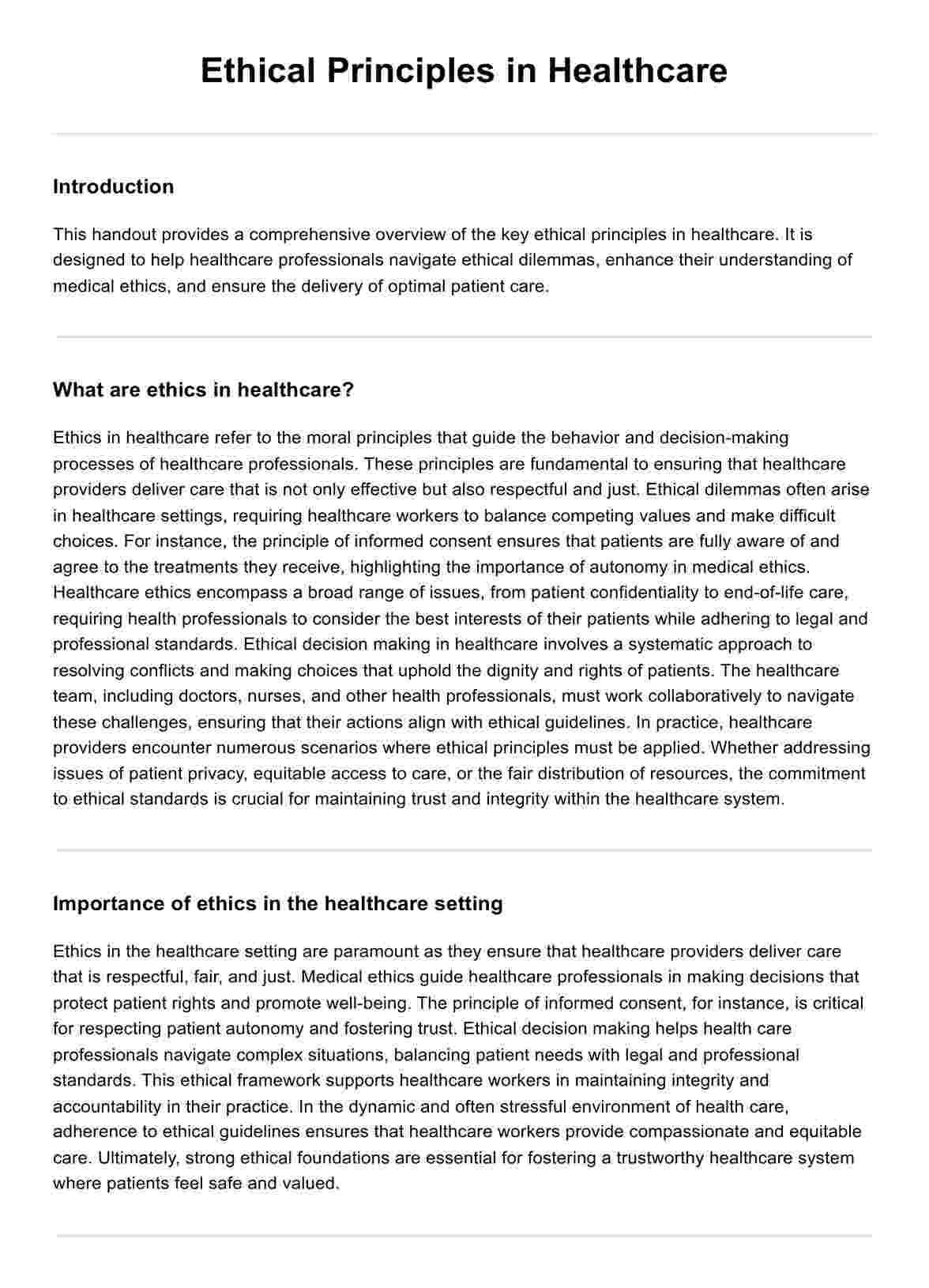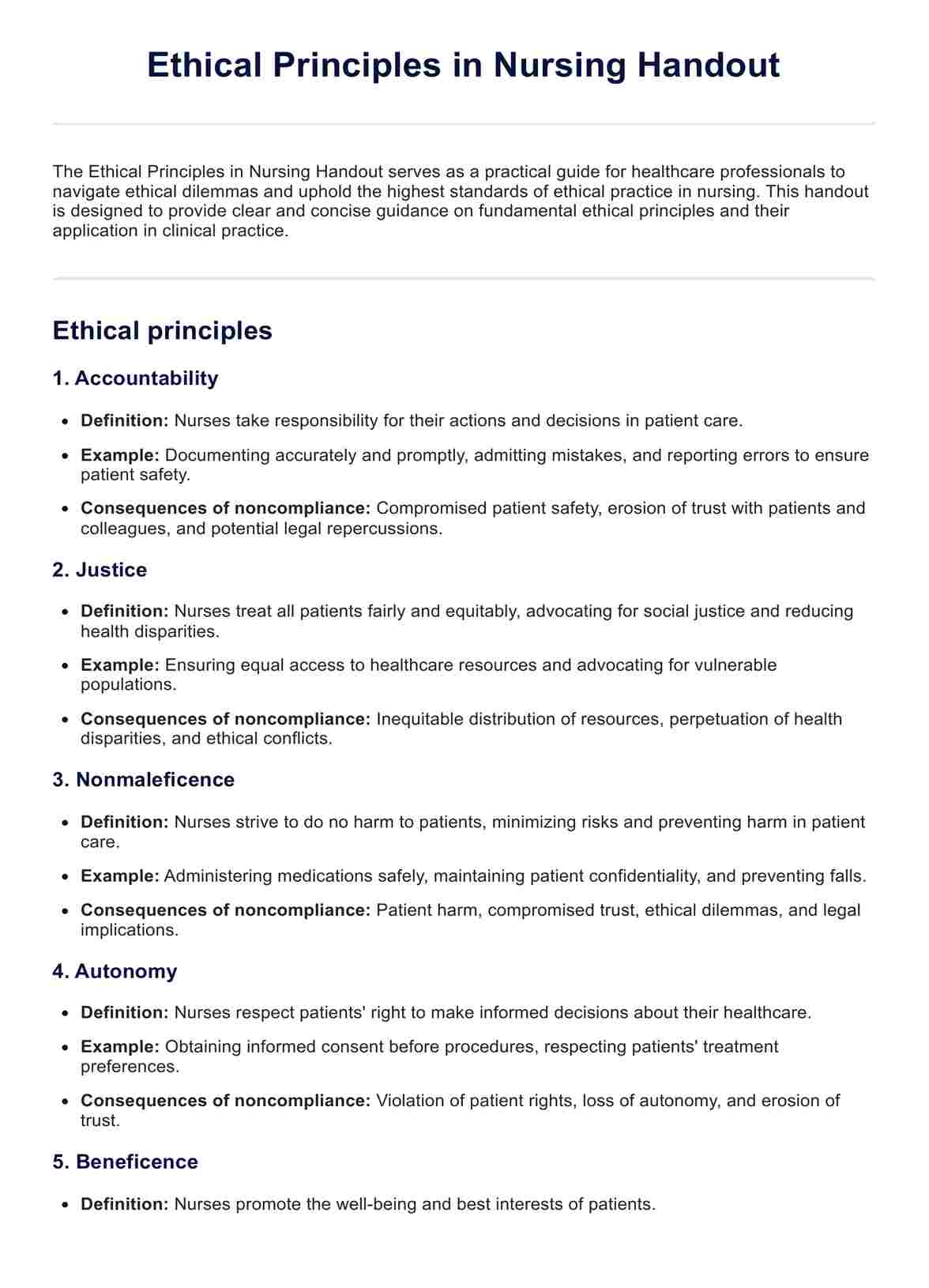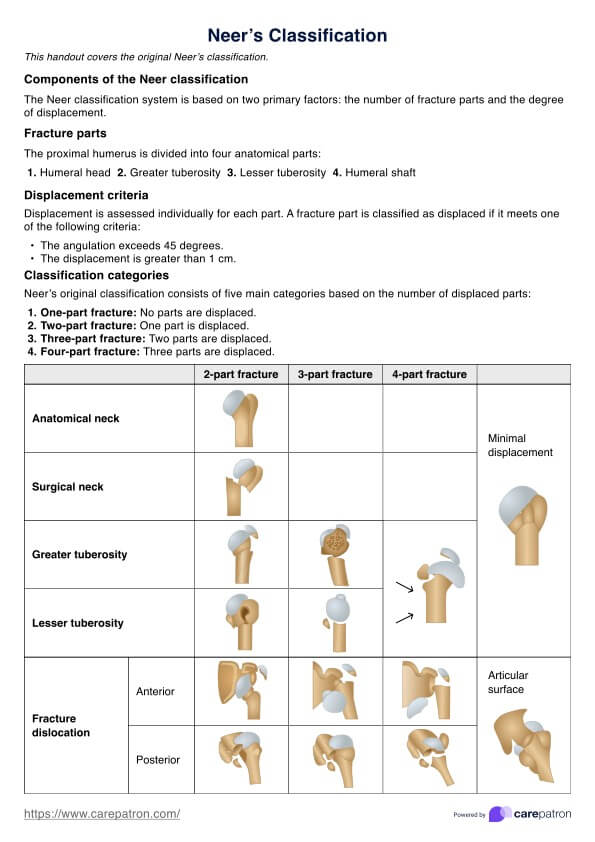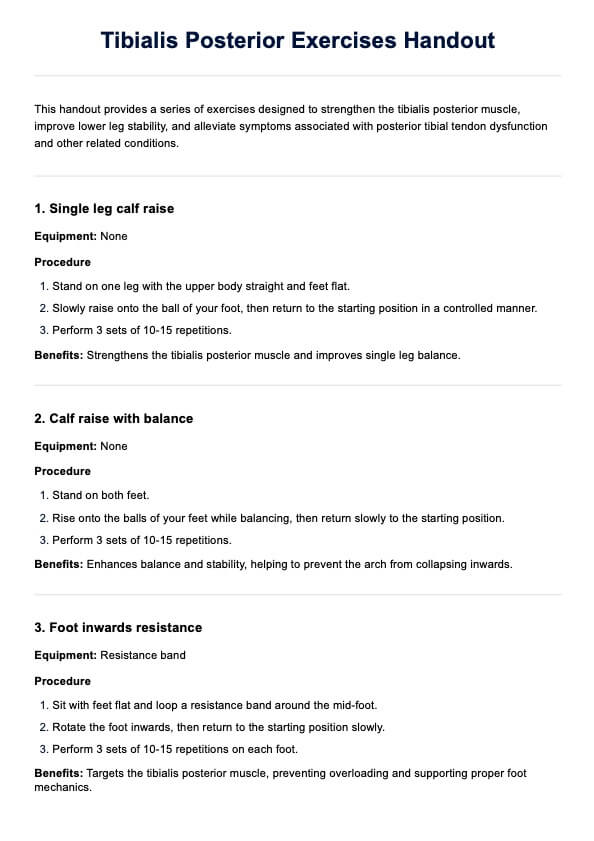Ethical Principles in Healthcare
Learn about key Ethical Principles in Healthcare with Carepatron's free PDF download. Explore examples and best practices to ensure ethical decision-making in the healthcare industry.


What are ethics in healthcare?
Ethics in healthcare refers to the moral principles that guide healthcare professionals' behavior and decision-making processes. These principles are fundamental to ensuring that healthcare providers deliver care that is not only effective but also respectful and just. Ethical dilemmas often arise in healthcare settings, requiring healthcare workers to balance competing values and make difficult choices. For instance, the principle of informed consent ensures that patients are fully aware of and agree to the treatments they receive, highlighting the importance of autonomy in medical ethics.
Healthcare ethics encompass a broad range of issues, from patient confidentiality to end-of-life care, requiring health professionals to consider the best interests of their patients while adhering to legal and professional standards. Ethical decision-making in healthcare involves a systematic approach to resolving conflicts and making choices that uphold the dignity and rights of patients. The healthcare team, including doctors, nurses, and other health professionals, must work collaboratively to navigate these challenges, ensuring their actions align with ethical guidelines.
In practice, health care professionals encounter numerous scenarios where ethical principles must be applied. Whether addressing patient privacy issues, equitable access to care, or the fair distribution of resources, the commitment to ethical standards is crucial for maintaining trust and integrity within the healthcare system.
Importance of ethics in the healthcare setting
Ethics in the healthcare setting are paramount as they ensure that a healthcare provider delivers respectful, fair, and just care. Medical ethics guide healthcare professionals in making decisions that protect patient rights and promote well-being.
For instance, the principle of informed consent is critical for respecting patient autonomy and fostering trust. Ethical decision-making helps healthcare professionals navigate complex situations, balancing patient needs with legal and professional standards. This moral framework supports healthcare workers in maintaining integrity and accountability in their practice.
Adherence to ethical guidelines ensures that healthcare workers provide compassionate and equitable care in a busy healthcare environment. Solid ethical foundations are essential for fostering a trustworthy healthcare system where patients feel safe and valued.
Ethical Principles in Healthcare Template
Ethical Principles in Healthcare Example
What are ethical principles?
Ethical principles are foundational guidelines that help individuals determine right and wrong, guiding behavior and decision-making.
In healthcare, these principles include autonomy, beneficence, non-maleficence, and justice. Autonomy respects patients' rights to make their own decisions.
Beneficence promotes actions that benefit the patient. Non-maleficence emphasizes "not harm," ensuring treatments do not cause unnecessary harm. Justice involves providing fair and equitable care to all patients.
These principles serve as a moral compass for health care professionals, ensuring their actions align with professional standards and patients' best interests.
Ethical principles
Ethical principles are the cornerstone of healthcare, guiding professionals in making morally sound decisions and providing high-quality care. These principles ensure that patients are treated with respect, dignity, and fairness, fostering trust and integrity within the healthcare system.
Autonomy
Autonomy is an ethical principle that recognizes and respects individual's right to make decisions regarding their health and medical treatments.
This principle emphasizes the importance of informed consent, ensuring patients are fully informed about their treatment options and the potential risks and benefits. It empowers patients to take control of their healthcare decisions, reflecting their values and preferences.
For example, a healthcare provider must obtain consent before surgery, ensuring the patient understands and agrees to the procedure voluntarily. By honoring autonomy, healthcare professionals support patients' independence and self-determination.
Nonmaleficence
Nonmaleficence is the ethical principle of "do no harm," which obligates healthcare professionals to avoid causing unnecessary harm or suffering to patients. This principle is fundamental to medical ethics, guiding healthcare providers to carefully consider any treatment or intervention's potential risks and benefits.
For instance, a doctor must weigh a medication's side effects against its potential benefits to ensure it does not cause undue harm to the patient.
Nonmaleficence requires vigilance and a commitment to minimizing harm while providing adequate care. It ensures that the patient's well-being remains a top priority in all healthcare decisions.
Beneficence
Beneficence is the ethical principle that promotes actions that benefit the patient and contribute to their well-being. Healthcare professionals are obligated to act in the best interest of their patients, providing care that enhances their health and quality of life.
This principle goes beyond avoiding harm; it involves actively contributing to the patient's welfare. For example, a nurse administering pain relief to a patient after surgery practices beneficence by alleviating suffering and promoting recovery.
Beneficence requires healthcare providers to be compassionate, proactive, and committed to positive health outcomes.
Justice
Justice is the ethical principle that emphasizes fairness and equality in healthcare. Healthcare professionals must provide equitable care and resources to all patients, regardless of their background, socioeconomic status, or other factors. Justice ensures that every patient can access the necessary medical treatments and interventions.
For instance, a healthcare provider must ensure that two patients with the same condition receive the same level of care, regardless of their ability to pay.
By adhering to the principle of justice, healthcare workers contribute to a fair and unbiased healthcare system where all individuals are treated with equal consideration and respect.
Fidelity
Fidelity, or loyalty, involves fulfilling one's commitments and obligations to patients, colleagues, and the profession. Healthcare professionals are expected to act with honesty, integrity, and loyalty in their interactions with patients and colleagues, maintaining confidentiality and respecting privacy. For example, maintaining patient confidentiality and upholding professional standards of conduct demonstrate fidelity in healthcare practice.
Veracity
Veracity emphasizes the importance of truthfulness and honesty in healthcare communication. Healthcare professionals must provide accurate and truthful information to patients, enabling them to make informed decisions about their care.
This principle entails avoiding deception or withholding relevant information that could impact patient decision-making. For example, providing clear and transparent explanations of medical conditions and treatment options demonstrates veracity in healthcare communication.
Ethical principles are the cornerstone of healthcare, guiding professionals in making morally sound decisions and providing high-quality care. These principles ensure that patients are treated with respect, dignity, and fairness, fostering trust and integrity within the healthcare system.
Autonomy
Autonomy is an ethical principle that recognizes and respects individual's right to make decisions regarding their health and medical treatments.
This principle emphasizes the importance of informed consent, ensuring patients are fully informed about their treatment options and the potential risks and benefits. It empowers patients to take control of their healthcare decisions, reflecting their values and preferences.
For example, a healthcare provider must obtain consent before surgery, ensuring the patient understands and agrees to the procedure voluntarily. By honoring autonomy, healthcare professionals support patients' independence and self-determination.
Nonmaleficence
Nonmaleficence is the ethical principle of "do no harm," which obligates healthcare professionals to avoid causing unnecessary harm or suffering to patients. This principle is fundamental to medical ethics, guiding healthcare providers to carefully consider any treatment or intervention's potential risks and benefits.
For instance, a doctor must weigh a medication's side effects against its potential benefits to ensure it does not cause undue harm to the patient.
Nonmaleficence requires vigilance and a commitment to minimizing harm while providing adequate care. It ensures that the patient's well-being remains a top priority in all healthcare decisions.
Beneficence
Beneficence is the ethical principle that promotes actions that benefit the patient and contribute to their well-being. Healthcare professionals are obligated to act in the best interest of their patients, providing care that enhances their health and quality of life.
This principle goes beyond avoiding harm; it involves actively contributing to the patient's welfare. For example, a nurse administering pain relief to a patient after surgery practices beneficence by alleviating suffering and promoting recovery.
Beneficence requires healthcare providers to be compassionate, proactive, and committed to positive health outcomes.
Justice
Justice is the ethical principle that emphasizes fairness and equality in healthcare. Healthcare professionals must provide equitable care and resources to all patients, regardless of their background, socioeconomic status, or other factors. Justice ensures that every patient can access the necessary medical treatments and interventions.
For instance, a healthcare provider must ensure that two patients with the same condition receive the same level of care, regardless of their ability to pay.
By adhering to the principle of justice, healthcare workers contribute to a fair and unbiased healthcare system where all individuals are treated with equal consideration and respect.
Fidelity
Fidelity, or loyalty, involves fulfilling one's commitments and obligations to patients, colleagues, and the profession. Healthcare professionals are expected to act with honesty, integrity, and loyalty in their interactions with patients and colleagues, maintaining confidentiality and respecting privacy. For example, maintaining patient confidentiality and upholding professional standards of conduct demonstrate fidelity in healthcare practice.
Veracity
Veracity emphasizes the importance of truthfulness and honesty in healthcare communication. Healthcare professionals must provide accurate and truthful information to patients, enabling them to make informed decisions about their care.
This principle entails avoiding deception or withholding relevant information that could impact patient decision-making. For example, providing clear and transparent explanations of medical conditions and treatment options demonstrates veracity in healthcare communication.
Benefits of having a handout on ethics principles
Educating healthcare professionals on ethical principles through handouts offers numerous advantages. It enhances their ability to navigate complex ethical dilemmas and provide optimal patient care.
Enhanced understanding of medical ethics
Handouts concisely explain key ethical principles, such as autonomy, beneficence, nonmaleficence, and justice, helping healthcare professionals grasp the fundamentals of biomedical ethics. Understanding these principles enables them to recognize and address ethical issues in various clinical scenarios.
Guidance in ethical decision-making
A well-designed handout offers practical guidance on ethical decision-making processes, equipping healthcare professionals with systematic approaches to resolving ethical dilemmas. By providing frameworks for ethical analysis and decision-making, handouts empower healthcare providers to navigate challenging situations with confidence and integrity.
Promotion of ethical obligations
Handouts reinforce healthcare professionals' ethical obligations to prioritize patient welfare and respect patient autonomy. Handouts cultivate a culture of ethical awareness and accountability within healthcare settings by highlighting the importance of adhering to ethical standards and fostering trust and confidence among patients and colleagues.
Facilitation of optimal patient care
Ultimately, handouts on ethical principles contribute to optimal patient care by equipping healthcare professionals with the knowledge and tools to address ethical challenges effectively. Through promoting moral reflection and decision-making, handouts help ensure that healthcare providers uphold ethical standards and prioritize the well-being of their patients in every aspect of care delivery.
Common ethical dilemmas healthcare professionals may face
Healthcare professionals frequently encounter ethical dilemmas that challenge their ability to provide optimal patient care while adhering to ethical standards. One common dilemma involves balancing patient autonomy with the principle of beneficence, such as when a patient refuses life-saving treatment.
Another dilemma arises in resource allocation, where healthcare providers must decide how to distribute limited resources fairly among patients, highlighting the principle of justice. End-of-life decisions, such as whether to withdraw life support, often present conflicts between respecting patient wishes and minimizing harm (nonmaleficence).
Maintaining patient confidentiality can also be challenging when disclosing information might prevent harm to others.
Understanding these dilemmas requires healthcare professionals to carefully weigh ethical principles and make decisions that uphold their ethical obligations while ensuring the best possible patient outcomes.
Commonly asked questions
The ethical principles of healthcare include autonomy, beneficence, nonmaleficence, justice, fidelity, and veracity. These principles guide healthcare professionals in making morally sound decisions and providing patient-centered care.
Ethical principles are crucial in healthcare as they ensure patient care is delivered with respect, fairness, and integrity. They help maintain trust between patients and healthcare providers and promote high standards of practice.
The purpose of ethical principles is to provide a framework for healthcare professionals to navigate ethical dilemmas and make decisions that uphold the dignity and rights of patients. They ensure that care is both effective and morally sound.


